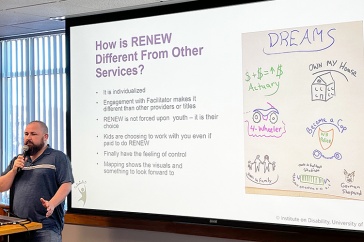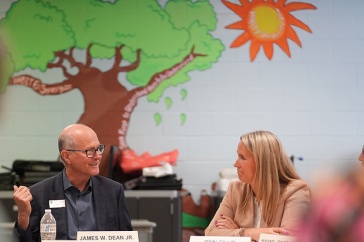
The key to successful early childhood development and learning lies in the creation of joyful environments that allow children to take an active role in their discovery through inquiry and reflection. In a kindergarten class, children fascinated by the idea of letters and packages coming to homes from far away places lead the teacher to present her students with the challenge of creating a mail system for the classroom. Students support their literacy skills by writing letters, practice their math skills by counting and sorting the mail, learn about the various jobs of the mail system through role-play and demonstrate problem-solving in the creation of their class’s mail truck.
This is an example of guided play, a research-based teaching method that provides opportunities for learning to be student-led. Foundational support from teachers helps children develop the skills needed to be successful in an ever-evolving, diverse world, and learn early reading, writing and mathematics concepts.
UNH’s College of Health and Human Services (CHHS) is a leader in playful learning pedagogy and research. Thanks to a three-year, $26.8 million preschool development grant from the U.S. Department of Health and Human Services’ Administration for Children and Families, CHHS educators and researchers are supporting guided play concepts by providing personalized, one-on-one coaching to early childhood teachers throughout New Hampshire. It’s one of many initiatives contained in the grant, which runs through 2022.
The preschool development grant continues New Hampshire’s efforts?to understand how to effectively support children from birth to age 8 and build an evidence-based approach to improving outcomes for Granite State families, schools and communities, according to Kimberly Nesbitt, associate professor in UNH’s department of human development and family studies and the grant’s primary investigator.
“Building a solid foundation to improve outcomes for our children, families, schools and communities was the charge of the grant,” she says. “Programs to support families tend to be siloed. The grant aims to break down these silos, see how they work together and create new ways to provide more comprehensive services for New Hampshire families that are effective, inclusive, responsive, efficient and evidence-informed.”
“Our intent throughout this process is not just focusing on children being served in New Hampshire but families as a whole.”
UNH is leading the grant program, in conjunction with New Hampshire’s Department of Health and Human Services (DHHS) and Department of Education (DOE), and the governor's early childhood advisory council.?
“The partnership between DOE, DHHS, the Governor’s Council for Thriving Children and UNH has been vital to accelerate collective efforts across our state to improve experiences for young children and their families,” says Christine Brennan, deputy commissioner of the New Hampshire DOE. “UNH’s expertise has been essential to advancing our efforts to ensure bright futures for New Hampshire. This collaboration further aims to enhance the state’s early childhood system.”
The preschool development grant offers a holistic approach, says Meredith O’Shea, the grant’s project director at UNH’s department of human development and family studies. “Our intent throughout this process is not just focusing on children being served in New Hampshire but families as a whole,” she says. “For example, this Fall, the grant team is working with UNH’s Carsey School to conduct an assessment to understand the needs of families with young children in New Hampshire.”
To date, the grant’s successes include:
- A new Early Childhood Initiative website, unveiled this month, outlining the grant’s goals and achievements and providing information about play-based learning and coaching for early childhood educators.
- Creating a strategic plan for early childhood in the state, based on community and family needs assessments.
- Support for New Hampshire’s Family Resource Centers, including increasing family awareness of the Centers and expanding access and programming to underserved groups.
- Grants awarded to New Hampshire community health and service organizations—such as the United Way—to create regional partnerships that bolster early childhood care, education and family support.
- Grants directly to New Hampshire communities to support capacity building, needs assessments and strategic planning, and expand programs and practices in their towns and cities.
- Support for New Hampshire’s new childhood governance model, including the Governor’s Council for Thriving Children, a state advisory council on early childhood care and education established by Governor Chris Sununu and co-led by the NH DHHS and DOE.
With funding from the New Hampshire Charitable Foundation, Nesbitt and her colleagues at UNH are developing a plan for long-term sustainability to deliver best practices to the state’s early childcare and education workforce and stakeholders. “We’re pursuing the goal of creating an Early Childhood Institute of Excellence at UNH in hopes of ensuring that our state’s young children are learning and thriving now and in the future,” she says.?

Child Study and Development Center
Playing for Success
Teacher coaching around play-based learning is one of the most tangible results to date of the preschool development grant. Nesbitt and her colleagues have provided in-service professional development to more than 40 New Hampshire school districts. Early childhood educators have received individualized coaching—inside their classrooms and virtually—to increase teacher-initiated, child-directed, hands-on guided play, which can lead to better learning outcomes for children.
Preschool teacher Linda Rozamus from Rainbowland Development Center in Bedford, NH, and Amy Velez, a kindergarten teacher at East Derry Memorial Elementary School, were mentored by Jen Berube, an early learning coach from CHHS. Rozamus, who teaches 3 and 4-year-olds, says her coaching experience with Berube transformed not only her classroom set-up but her perspective on working with children. “I learned so much,” says Rozamus. “When it’s time for centers, I pair the children up with each other and let them choose what they want to do. The kids like it so much more.” Empowered by her new teaching strategies, Rozamus is now pursuing an associate’s degree in child development.
Velez’s perspective on play-based learning shifted. “Initially, I thought playful learning was giving students counting games or games that taught letters or letter sounds,” she says. Now, she builds guided play time throughout the school day, asking students how they can demonstrate new concepts while playing—for example, a math problem. “If the children want to play with cars, we can have some drive away, then talk about how many are left,” she says. “They’re completely invested in the activity because it was their idea to start with.” Velez is eager to share her positive experience with others. “Coaching gave me more boldness to approach leaders and decision-makers to discuss the real results of creative play in the classroom. I met Governor Sununu this year and that’s the first thing I talked to him about.”
UNH remains at the forefront of this creative learning. “The coaching we’re doing is aligned with state needs,” Nesbitt says. “It supports New Hampshire’s efforts to increase the quality of early childhood education.” And it’s the reason Nesbitt intends to pursue additional funding, once the preschool development grant period ends, to keep the momentum going.
-
Written By:
Debbie Kane | Freelance Writer



















































